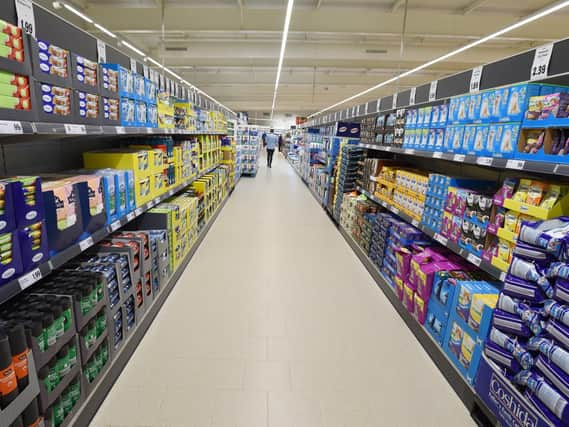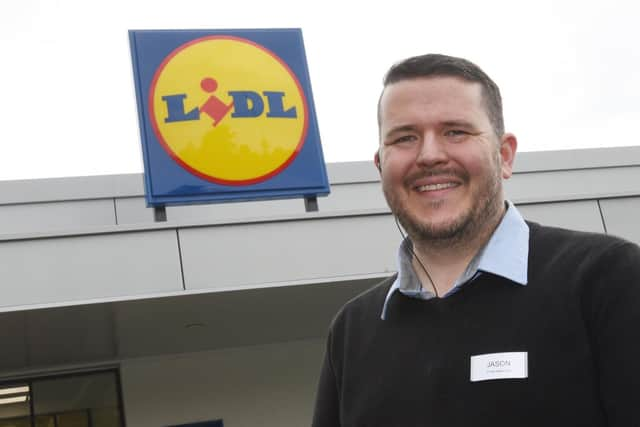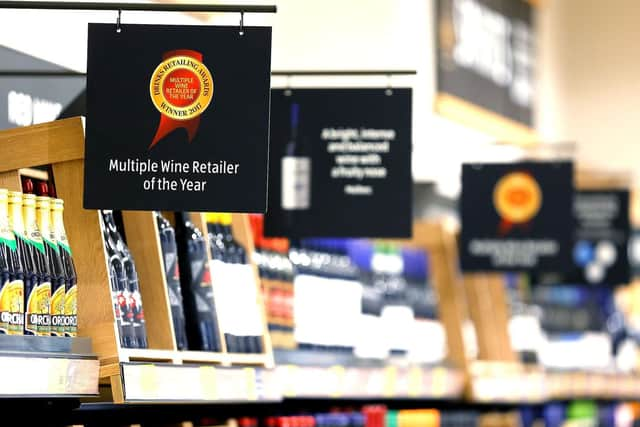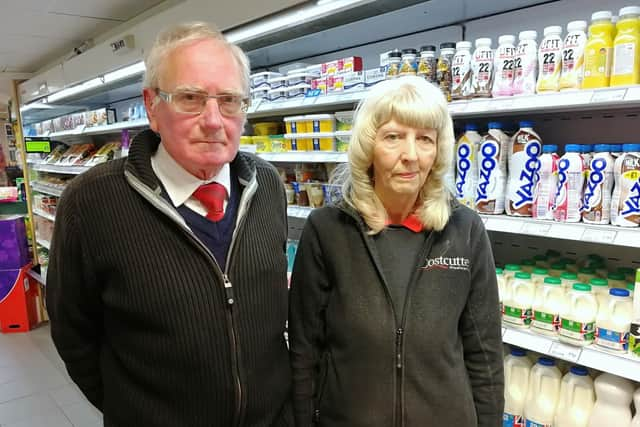More discount supermarkets set to be built as fears for small retailers grow


With a new Aldi set to be created in Leyland, it can be revealed budget rival Lidl is also planning to open a new store in Fulwood – to add to the two it already has in Preston.
Both Aldi and Lidl have major expansion plans across the North West as their share of the grocery marketplace increases.
Advertisement
Hide AdAdvertisement
Hide AdHowever, while welcoming the new jobs created by the chains, Lancashire business leaders and traders are urging shoppers not to forget their smaller corner stores.


The North & Western Lancashire Chamber of Commerce and the Lancashire-based Federation of Small Businesses have raised concerns about the effect on small shops.
Alan Welsh, policy manager at the Chamber, said: “If there is one genuine concern about the growth of supermarkets it is the potential damage to small, local shops who cannot compete on price.”
Lidl has just opened new stores in Chorley and Lancaster in the last fortnight – and is now understood to be bringing a further new store to the Eastway Hub at Fulwood – less than a mile from a new Aldi also being built on Eastway at the junction with Oliver’s Place.
Advertisement
Hide AdAdvertisement
Hide AdThe Eastway Hub is a new retail site sandwiched between Eastway and the M55, to the west of the A6.


Lidl’s regional head of property, Stuart Jardine, said recently: “It is great for us to be able to create more jobs and investment opportunities in the area, and we can’t wait to start serving our multi-award winning products to the local community.”
Aldi, now the UK’s fifth largest and fastest growing supermarket, will also open six new stores in the North West this year, creating more than 180 new roles.
The supermarket is also refurbishing 12 stores across the region - and planning consent was given last week for them to create a new branch in Golden Hill Lane, Leyland, to replace an existing store at Westgate.
Advertisement
Hide AdAdvertisement
Hide AdIt was approved despite a 390-strong petition of people opposing the development, at the junction with School Lane, on traffic grounds. Aldi says 40 people will be employed at the new store.


Ruth Doyle, regional managing director at Aldi UK, said: “We’ve set out ambitious plans for this year and we’re investing heavily across the North West to ensure even more people in the region can shop and save closer to home.”
Small shopkeepers’ fears
The owners of a corner shop in Leyland say they face an uncertain future following the decision to approve a new Aldi supermarket just yards from the store where they have spent most of their lives.
The independently-run Costcutter store on School Lane has been in the Brindle family for almost 60 years. David and his wife Margaret have owned the shop since 1972 and their son Stephen has worked with them since he finished school nearly three decades ago.
Advertisement
Hide AdAdvertisement
Hide AdReflecting on the imminent arrival of a new retail neighbour, David, 72, says he can no longer be certain that there will be a business left to hand over to his son.
“One never knows,” he smiles wryly, just a day after he made an impassioned plea to members of South Ribble Borough Council’s planning committee to reject the proposal by the discount retailer to build a new store opposite his own.
He had argued that the outlet would do nothing to increase choice in the area - because Tesco, Asda, Morrissons and the current Aldi already lie within a mile radius of the new store.
“The land needed developing, but we didn’t need another supermarket,” David adds. “We get a lot of pensioners in who maybe live at home on their own and we help them out, even if it’s just by having a little chat. Do they get that in a supermarket? I don’t believe they do.”
Advertisement
Hide AdAdvertisement
Hide AdMeanwhile, Margaret – who will turn 70 this year – said her “heart sank” when the new Aldi was given the go-ahead.
“I’m here at 5.15 every morning – and the shop is open until 10 at night,” Margaret says.
“Some combination of us is here nearly all the time – it’s a difficult job.”
Views of business leaders
Alan Welsh, policy manager at the North & Western Lancashire Chamber of Commerce said: “This is more of a personal view, but I see more competition amongst supermarkets as a good thing.
Advertisement
Hide AdAdvertisement
Hide Ad“The CMA rightfully blocked the merger between Asda and Sainsbury’s on the grounds that it would reduce quality and increase prices for customers.
“The discount supermarkets are succeeding because they have struck the right balance between price and quality and the market data would indicate it’s a model that customers like. The big four need to up their game, not seek to monopolise the market.
“There is also a level of ‘supermarket snobbery’ in this country which fuels most of the opposition to discount stores opening in some locations.
"However, if there is one genuine concern about the growth of supermarkets it is the potential damage to small, local shops who cannot compete on price and are facing further pressure from big retailers who are lobbying for extended opening hours, especially on Sundays.
Advertisement
Hide AdAdvertisement
Hide Ad“I would urge the Government to protect small independent shops, promote buying local and resists pressure from the big supermarkets to allow longer trading hours.
Paul Foster, Development Manager of the Lancashire-based FSB, said many customers in Lancashire preferred smaller retailers despite the rise of discount supermarkets.
He said “Independent retailers have long been accustomed to having to compete with the supermarket chains.
“Aldi and Lidl have had success but this has mostly seen them take customers away from other big supermarkets.
Advertisement
Hide AdAdvertisement
Hide Ad“Smaller retailers are still the preferred option for many consumers who want local produce, a focus on the community and great customer service.
“That being said, small retailers are being squeezed by rising costs of staffing and premises and are having to work hard to compete.
“An overhaul of the business rates system is long overdue and will help to ensure that a good mix of businesses on our high streets is encouraged.”
The Competitions and Markets Authority recently blocked the proposed merger between Sainsbury’s and Asda to “protect the millions of people who shop at Sainsbury’s and Asda every week” from increased prices.
Changing shopping habits
Advertisement
Hide AdAdvertisement
Hide AdOnce upon a time all shoppers would head to a major supermarket to do their weekly shop.
It was a one-stop event and the big players like Tesco, Asda and Sainsbury’s were coining it in.
But discounters like Aldi and Lidl are now attracting more and more people who do a “split” shop.
Cheap drinks, cooked meats, cheese and toiletries are just some of the reasons that shoppers walk out of Aldi and Lidl with their trollies piled high.
Many then “top up” their shopping at a major supermarket.
Advertisement
Hide AdAdvertisement
Hide AdLancashire shopper and mother or two Karen Seddon, of Chorley, said: “It is no wonder that Aldi and Lidl are doing so well.
“Some of the big supermarkets are now so dear they are losing customers.
“The quality at Aldi and Lidl is getting better all the time. I always split my shop between Aldi and Tesco or M&S now. No way can I afford to do one big shop at a major supermarket. It costs a fortune.”
Aldi and Lidl are worth a collective £344m more than this time last year as a cooler spring slowed supermarket spending against last May’s record temperatures, figures show.
Advertisement
Hide AdAdvertisement
Hide AdThe two supermarkets reached a combined record market share of 13.8 per cent over the 12 weeks to May 19 as almost one million more households visited Aldi compared with last year and an additional 630,000 shopped at Lidl, Kantar reported.
Their success comes as the grocery market grew by 1.3 per cent compared with the same period last year, when the hottest May on record combined with the royal wedding and FA Cup final resulted in a 2.7 per cent boost for the sector. Sales of beer and lager, ice cream and sun care fell by seven per cent, 12 per cent and 16 per cent respectively during the past four weeks as cooler weather impacted upon discretionary spending.
Chris Hayward, consumer specialist at Kantar, said: “Growth of 1.3 per cent may appear modest when compared with last year’s 2.7 per cent, however the sector continues to demonstrate resilience and volume sales remain unchanged from last year.
“We have two European football finals with British interest, the Cricket World Cup and the FIFA Women’s World Cup to look forward to in the coming weeks, and retailers will be aiming to capitalise on these events and attract more shoppers throughout summer.”